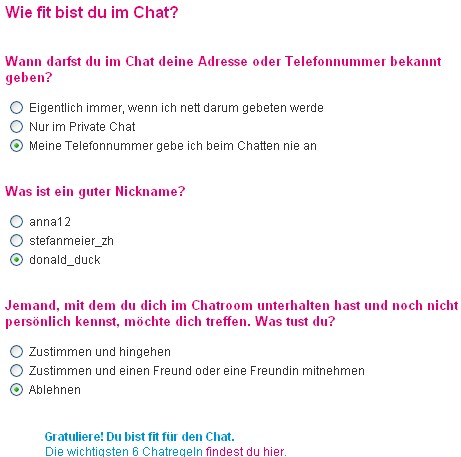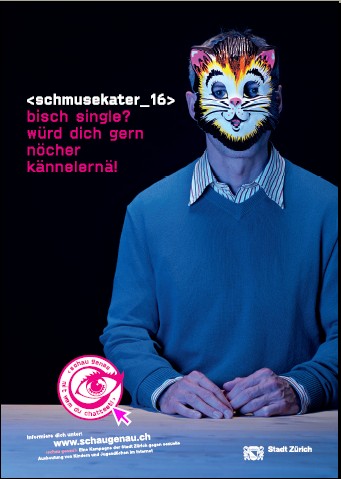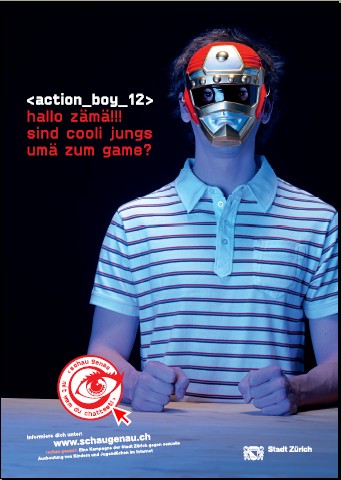| using the right media mix does help tremendously |
| The city of Zurich has launched a campaign for better security in online chats |
| We tell you, how and why using social media would have given Zurich a greater bang for the buck |
The online market features images of pedophilia (nude photographs of children in various poses), hebephilia (youth/teens), and paraphilia (images of bondage).Sexual exploitation of children is definitely an issue we should be concerned about. Hence, any campaign raising awareness and improving prevention regarding this matter must be applauded.2008-02-18 was the Safer Internet Day 2008 – interesting post you find here:Safer Internet Day – Safer Cyberspace – why it might remain a pipe dream
ZURICH’S CAMPAIGN for a SAFER INTERNET FOR OUR CHILDREN
To fight online pedophiles and improve online security for kids in chat rooms, the city of Zurich has launched the first campaign on this matter in Switzerland. Below we discuss some of the reasons why the campaign might have been a greaters success if it would have been coordinated with other activities beyond the city itself (e.g., Safer Internet Day 2008).
Reason 1 Target audience is not clearly defined
The campaign is targeting several groups including children, parents, teachers and the public in general. But this makes achieving success ever more difficult because what works with a 10-year old fails to convince a 15-year old ‘dude.’ Finally, parents need a different message than their children….
Reason 2 Media used to reach out is not preferred by the campaign’s target audience(s)
The campaign is using a few billboards all through town . Messages conveyed are such as that one shown to the left.
But many kids do not get their daily news via billboards or by looking at printed media. One exception might be those dailies available for free in various distribution boxes at bus stops and so on (e.g., 20 minutes, heute, etc.). So how are kids supposed to get the message if they fail to look at the billboards or do not read local newspapers?
Reason 3 Unclear what the campaign is supposed to accomplish
Looking at the campaign’s media coverage, billboards and brochures published, one might get the impression that the campaign is supposed to raise awareness about:
a) pedophiles in online chat rooms,
b) sexual exploitation of children on the Internet, AND
c) how kids can take better security measures in chat rooms and so forth.
But would it not be easier to just focus on better security …. Better security behavior by children using the Internet for such purposes as participating in chat rooms, social networks, using voice over IP to call their friends and so on are all widely used applications. What they have in common is that they all expose children to slightly different types of risks regarding their safety, security and privacy.
Reason 4 Target audience(s) fail to get the message
To launch the campaing, the two city councillors’ – Esther Maurer (police) and Gerold Lauber (education) gave a press conference in late January.
We made a test and asked a few street car and bus riders in Zurich (parents with children) what they thought these billboards were supposed to convey. At least 79% failed to get it.
But maybe the children get the message?
So we asked 4th graders and 7th graders. In one class, about 87% had seen those billboards but not really reflected upon their message or discussed it with any of their peers.
When we showed them these billboards in class, they had a hard time making sense out of them.
Reason 5 material provided for children does not go beyond the obvious
One of the campaign’s objectives is raising awareness through community outreach programs. As well, a web page was created that offers kids information about how to better protect themselves in chat rooms. For instance, children or parents can fill out an online survey about chat security, as shown here:
 Here you can find more information about this important campaign:
Here you can find more information about this important campaign:
schau genau campaign – city of Zurich – 6 chat tips
A group of 4th graders in and their teacher from a school in Zurich developed a guide for better chat security.Their checklist builds on the above standards while focusing and illustrating issues that children will face and must make decisions about whenjoining chat rooms,signing up for MySpace Switzerland orusing Google Talk or Skype for chatting and Voice over IP.Get the kids and their teacher’s suggestions here:
Safer Internet Day 2008 – 5 Regeln fuer den sicheren Online Chat
Reason 6 the campaign is not reaching into classrooms
While the campaign is being a joint project between the city’s police and the school department, teacher’s and their pupils seem not to have been made part of this campaign.
We asked numerous school teachers around town. Few if any head heard about the campaign. At the same time, however, information technology and web tools are being pushed in the classroom and children search Google for information, use YouTube and many other tools for their school work and pleasure.
We dare to ask if better coordination might not have given this campaign a bigger return on investment on an issue that is vital to our children’s safety and security
Reason7 the campaign does not reach out for support by getting children and teenagers to communicate through a blog to other school pupils
Adults communicating with teenagers is a challenge. Any teacher or parent can attest to this. Hence, a campaign wanting to reach children needs to get them involved.
Another way would be using the social media that is getting ever more popular with school kids, offer a blog on the schau genau campaign’s web page
School pupils are getting into blogging and, most importantly, they address Internet security, privacy and sexual exploitation on their blogs:
– Schuelerblog der 4. Klasse aus dem Schulkreis Limmattal – Zuerich .
Blogging would have helped getting the conversation about the campaign spread faster. As well it would more likely continue to be discussed in school hallways and raise awareness
CyTRAP Labs’ take on this issue
We believe the schau genau campaign launched by the city of Zurich against sexual exploitation in chat rooms is a very important effort undertaken to better protect our children. No doubt about it.
There remains much to be done and even less time left. Unfortunately, in many countries including Switzerland and Zurich, teachers are pretty much left to their own devices when it comes to helping kids to protect themselves on the net.
How can parents help their kids regarding Internet safety when children know already more about the subject than their parents do?
So where are the tools, skills and know-how for better protection against cybercrime and online pedophiles supposed to come from if neither the average teacher nor parent knows more than the kid? And just to make sure, the kids are more often than not extremely careless until teachers have spent a few hours explaining and demonstrating to them in the classroom what it means to make a mistake …..
Coordination of such campagins usually helps in reaching more people than if one goes alone. If you need an example, just look at this year’s Safer Internet Day 2008 – its 5th year anniversary (2008-02-12) shows, each year the campaign has had a greater success by involving ever more children around the globe.
Remember, finding the right medium in a sea of choices is fast becoming more important than the message itself. Coordination with other activities such as the Safer Internet Day 2008 and its blogothone helps reaching children through different channels, including traditional media, internet, billboards, rock concerts and blogs.
So while Zurich is walking down the right path, much remains to be done….
PS. The ‘schau genau’ campagin runs during spring 2008 (started in January) and again in Fall 2008. The city is spending about Euro600,000 for billboards, the campaign’s webpage and so on.
============>
If this post was helpful to you, please consider stumbling it or subscribing to feeds from CyTRAP Labs. Cheers.
==========>
Also of interest:
– 8 reasons that speak for having a corporate blog
==========>

